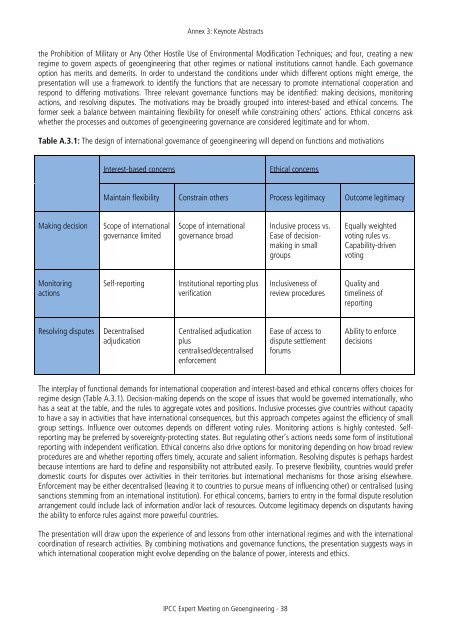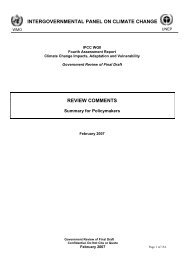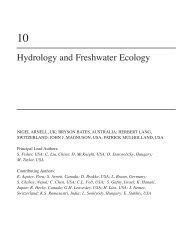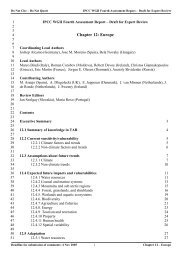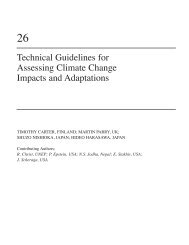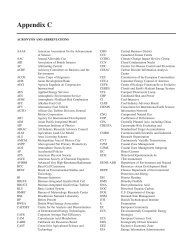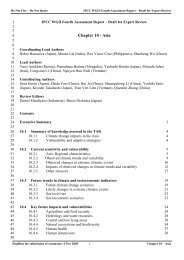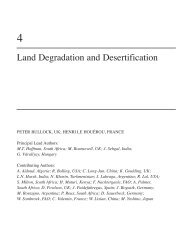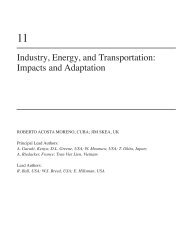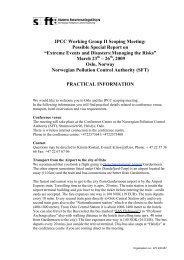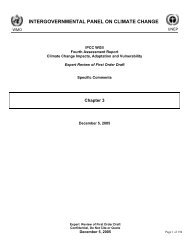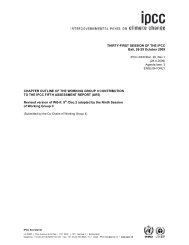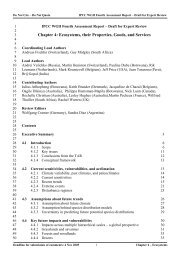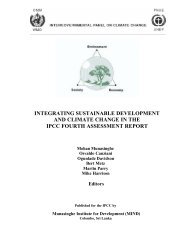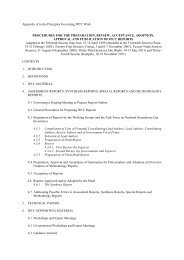IPCC Expert Meeting on Geoengineering
IPCC Expert Meeting on Geoengineering
IPCC Expert Meeting on Geoengineering
Create successful ePaper yourself
Turn your PDF publications into a flip-book with our unique Google optimized e-Paper software.
Annex 3: Keynote Abstracts<br />
the Prohibiti<strong>on</strong> of Military or Any Other Hostile Use of Envir<strong>on</strong>mental Modificati<strong>on</strong> Techniques; and four, creating a new<br />
regime to govern aspects of geoengineering that other regimes or nati<strong>on</strong>al instituti<strong>on</strong>s cannot handle. Each governance<br />
opti<strong>on</strong> has merits and demerits. In order to understand the c<strong>on</strong>diti<strong>on</strong>s under which different opti<strong>on</strong>s might emerge, the<br />
presentati<strong>on</strong> will use a framework to identify the functi<strong>on</strong>s that are necessary to promote internati<strong>on</strong>al cooperati<strong>on</strong> and<br />
resp<strong>on</strong>d to differing motivati<strong>on</strong>s. Three relevant governance functi<strong>on</strong>s may be identified: making decisi<strong>on</strong>s, m<strong>on</strong>itoring<br />
acti<strong>on</strong>s, and resolving disputes. The motivati<strong>on</strong>s may be broadly grouped into interest-based and ethical c<strong>on</strong>cerns. The<br />
former seek a balance between maintaining flexibility for <strong>on</strong>eself while c<strong>on</strong>straining others’ acti<strong>on</strong>s. Ethical c<strong>on</strong>cerns ask<br />
whether the processes and outcomes of geoengineering governance are c<strong>on</strong>sidered legitimate and for whom.<br />
Table A.3.1: The design of internati<strong>on</strong>al governance of geoengineering will depend <strong>on</strong> functi<strong>on</strong>s and motivati<strong>on</strong>s<br />
Interest-based c<strong>on</strong>cerns<br />
Ethical c<strong>on</strong>cerns<br />
Maintain flexibility C<strong>on</strong>strain others Process legitimacy Outcome legitimacy<br />
Making decisi<strong>on</strong><br />
Scope of internati<strong>on</strong>al<br />
governance limited<br />
Scope of internati<strong>on</strong>al<br />
governance broad<br />
Inclusive process vs.<br />
Ease of decisi<strong>on</strong>making<br />
in small<br />
groups<br />
Equally weighted<br />
voting rules vs.<br />
Capability-driven<br />
voting<br />
M<strong>on</strong>itoring<br />
acti<strong>on</strong>s<br />
Self-reporting<br />
Instituti<strong>on</strong>al reporting plus<br />
verificati<strong>on</strong><br />
Inclusiveness of<br />
review procedures<br />
Quality and<br />
timeliness of<br />
reporting<br />
Resolving disputes<br />
Decentralised<br />
adjudicati<strong>on</strong><br />
Centralised adjudicati<strong>on</strong><br />
plus<br />
centralised/decentralised<br />
enforcement<br />
Ease of access to<br />
dispute settlement<br />
forums<br />
Ability to enforce<br />
decisi<strong>on</strong>s<br />
The interplay of functi<strong>on</strong>al demands for internati<strong>on</strong>al cooperati<strong>on</strong> and interest-based and ethical c<strong>on</strong>cerns offers choices for<br />
regime design (Table A.3.1). Decisi<strong>on</strong>-making depends <strong>on</strong> the scope of issues that would be governed internati<strong>on</strong>ally, who<br />
has a seat at the table, and the rules to aggregate votes and positi<strong>on</strong>s. Inclusive processes give countries without capacity<br />
to have a say in activities that have internati<strong>on</strong>al c<strong>on</strong>sequences, but this approach competes against the efficiency of small<br />
group settings. Influence over outcomes depends <strong>on</strong> different voting rules. M<strong>on</strong>itoring acti<strong>on</strong>s is highly c<strong>on</strong>tested. Selfreporting<br />
may be preferred by sovereignty-protecting states. But regulating other’s acti<strong>on</strong>s needs some form of instituti<strong>on</strong>al<br />
reporting with independent verificati<strong>on</strong>. Ethical c<strong>on</strong>cerns also drive opti<strong>on</strong>s for m<strong>on</strong>itoring depending <strong>on</strong> how broad review<br />
procedures are and whether reporting offers timely, accurate and salient informati<strong>on</strong>. Resolving disputes is perhaps hardest<br />
because intenti<strong>on</strong>s are hard to define and resp<strong>on</strong>sibility not attributed easily. To preserve flexibility, countries would prefer<br />
domestic courts for disputes over activities in their territories but internati<strong>on</strong>al mechanisms for those arising elsewhere.<br />
Enforcement may be either decentralised (leaving it to countries to pursue means of influencing other) or centralised (using<br />
sancti<strong>on</strong>s stemming from an internati<strong>on</strong>al instituti<strong>on</strong>). For ethical c<strong>on</strong>cerns, barriers to entry in the formal dispute resoluti<strong>on</strong><br />
arrangement could include lack of informati<strong>on</strong> and/or lack of resources. Outcome legitimacy depends <strong>on</strong> disputants having<br />
the ability to enforce rules against more powerful countries.<br />
The presentati<strong>on</strong> will draw up<strong>on</strong> the experience of and less<strong>on</strong>s from other internati<strong>on</strong>al regimes and with the internati<strong>on</strong>al<br />
coordinati<strong>on</strong> of research activities. By combining motivati<strong>on</strong>s and governance functi<strong>on</strong>s, the presentati<strong>on</strong> suggests ways in<br />
which internati<strong>on</strong>al cooperati<strong>on</strong> might evolve depending <strong>on</strong> the balance of power, interests and ethics.<br />
<str<strong>on</strong>g>IPCC</str<strong>on</strong>g> <str<strong>on</strong>g>Expert</str<strong>on</strong>g> <str<strong>on</strong>g>Meeting</str<strong>on</strong>g> <strong>on</strong> <strong>Geoengineering</strong> - 38


